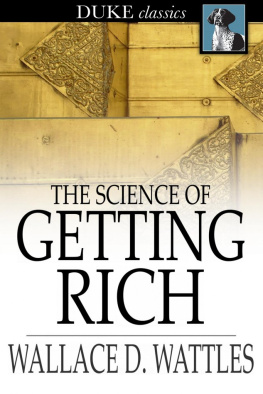Wallace D. Wattles - The Secret of Prosperity
Here you can read online Wallace D. Wattles - The Secret of Prosperity full text of the book (entire story) in english for free. Download pdf and epub, get meaning, cover and reviews about this ebook. year: 2017, publisher: Musaicum Books, genre: Romance novel. Description of the work, (preface) as well as reviews are available. Best literature library LitArk.com created for fans of good reading and offers a wide selection of genres:
Romance novel
Science fiction
Adventure
Detective
Science
History
Home and family
Prose
Art
Politics
Computer
Non-fiction
Religion
Business
Children
Humor
Choose a favorite category and find really read worthwhile books. Enjoy immersion in the world of imagination, feel the emotions of the characters or learn something new for yourself, make an fascinating discovery.
- Book:The Secret of Prosperity
- Author:
- Publisher:Musaicum Books
- Genre:
- Year:2017
- Rating:5 / 5
- Favourites:Add to favourites
- Your mark:
- 100
- 1
- 2
- 3
- 4
- 5
The Secret of Prosperity: summary, description and annotation
We offer to read an annotation, description, summary or preface (depends on what the author of the book "The Secret of Prosperity" wrote himself). If you haven't found the necessary information about the book — write in the comments, we will try to find it.
The Secret of Prosperity — read online for free the complete book (whole text) full work
Below is the text of the book, divided by pages. System saving the place of the last page read, allows you to conveniently read the book "The Secret of Prosperity" online for free, without having to search again every time where you left off. Put a bookmark, and you can go to the page where you finished reading at any time.
Font size:
Interval:
Bookmark:
Although the subject of the following sketch can hardly be classed under the head of Humbugs, he was an original genius, and a knowledge of some of his prominent traits seems appropriate in connection with one or two other passages of this book.
The country-seat of Bishop Shipley, the good bishop, as Dr. Franklin used to style him. B.
After the words "agreeable to" the words "some of" were interlined and afterward effaced. B.
Here follow in the margin the words, in brackets, "here insert it," but the poetry is not given. Mr. Sparks informs us (Life of Franklin, p. 6) that these volumes had been preserved, and were in possession of Mrs. Emmons, of Boston, great-grandmother of their author.
I fancy his harsh and tyrannical treatment of me might be a means of impressing me with that aversion to arbitrary power that has stuck to me through my whole life.
"A printing-house is always called a chapel by the workmen, the origin of which appears to have been that printing was first carried on in England in an ancient chapel converted into a printing-house, and the title has been preserved by tradition. The bien venu among the printers answers to the terms entrance and footing among mechanics; thus a journeyman, on entering a printing-house, was accustomed to pay one or more gallons of beer for the good of the chapel; this custom was falling into disuse thirty years ago; it is very properly rejected entirely in the United States." W. T. F.
The "Journal" was printed by Sparks, from a copy made at Reading in 1787. But it does not contain the Plan. Ed .
I got his son once 500. [Marg. note.]
Nothing so likely to make a man's fortune as virtue. [Marg. note.]
This is a marginal memorandum. B.
In the Middle Ages, Franklin, if such a phenomenon as Franklin were possible in the Middle Ages, would probably have been the founder of a monastic order. B.
See the votes. [Marg. note.]
See the votes to have this more correctly. [Marg. note.]
See votes.
My acts in Morris's time, military, etc. [Marg. note.]
This dialogue and the militia act are in the "Gentleman's Magazine" for February and March, 1756. [Marg. note.]
The many unanimous resolves of the Assembly what date? [Marg. note.]
Here terminates the Autobiography, as published by Wm. Temple Franklin and his successors. What follows was written in the last year of Dr. Franklin's life, and was first printed (in English) in Mr. Bigelow's edition of 1868. Ed .
Dr. Franklin, as I have been made to understand, for many years published the Pensylvania Almanack, called Poor Richard [Saunders], and furnished it with various sentences and proverbs, which had principal relation to the topics of "industry, attention to one's own business, and frugality." The whole or chief of these sentences and proverbs he at last collected and digested in the above general preface, which his countrymen read with much avidity and profit. B. V.
Cf. Cooke Taylor, Modern Factory System, pp. 74-77.
Even in work that lies so near the fortuities of animate nature as dairying, stock-breeding, and the improvement of crop plants, a determinate, reasoned routine replaces the rule of thumb. By mechanical control of his materials the dairyman, e.g., selectively determines the rate and kind of the biological processes that change his raw material into finished product. The stock-breeder's aim is to reduce the details of the laws of heredity, as they apply within his field, to such definite terms as will afford him a technologically accurate routine of breeding, and then to apply this technological breeding process to the production of such varieties of stock as will, with the nearest approach to mechanical exactness and expedition, turn the raw materials of field and meadow into certain specified kinds and grades of finished product. The like is true of the plant-breeders. Agricultural experiment stations and bureaus, in all civilized countries, are laboratories working toward an effective technological control of biological factors, with a view to eliminating fortuitous, disserviceable, and useless elements from the processes of agricultural production, and so reducing these processes to a calculable, expeditious, and wasteless routine.
Cf. Sombart, Moderne Kapitalismus, vol. II, ch. III.
Twelfth Census (U.S.): "Manufactures," pt. I, p. xxxvi.
E.g., lumber, coal, paper, wool and cotton, grain, leather, cattle for the packing houses. All these and many others are to an increasing extent spoken for, delivered, and disposed of under well-defined staple grades as to quality and dimensions, weight and efficiency.
Well shown in the case of wheat and flour; but the like is true as regards the stocks of other commodities carried by producers, jobbers, retailers, and consumers.
Well illustrated by the interdependence of the various branches of iron and steel production.
As seen, e.g., in the dependence of oil production or oil refining on the pipe lines and their management, or in the dependence of the prairie farmers on the railway lines, etc.
It may be noted in this connection, on the one hand, that a population which is in no degree habituated to the modern industrial process is unable to adapt its mode of life to the requirements of this method of supplying human wants, and so can derive but little benefit, and possibly great discomfort, from a forcible intrusion of the machine industry; as, for instance, many of the outlying barbarian peoples with whom the Western industrial culture is now enforcing a close contact. On the other hand, it is also true that even the most adequately trained modern community, among whom the machine industry is best at home, does not respond with fruitless alacrity to the demands and opportunities which this system holds out. The adaptation of habits of life and of ideals and aspirations to the exigencies of the machine process is not nearly complete, nor does the untrained man instinctively fall into line with it. Even the best-trained, severely disciplined man of the industrial towns has his seasons of recalcitrancy.
The dependence of one process upon the working of the others is sometimes very strict, as, for instance, in the various industries occupied with iron, including the extraction and handling of the ore and other raw materials. In other cases the correlation is less strict, or even very slight, as, e.g., that between the newspaper industry and lumbering, through the wood-pulp industry, the chief component of the modern newspaper being wood-pulp.
The ulterior ground of efforts directed to the accumulation of wealth is discussed at some length in the Theory of the Leisure Class, ch. II. and V, and the economic bearing of the business man's work is treated in a paper on "Industrial and Pecuniary Employments," in the Proceedings of the thirteenth annual meeting of the American Economic Association. Cf. also Marshall, Principles of Economics (3d ed.), bk. I. ch. III, bk. IV. ch. XII, bk. V. ch. IV, bk. VII. ch. VII and VIII; Bagehot, Economic Studies, especially pp. 53 et seq.; Walker, Wages Question, ch. XIV; and more especially Sombart, Moderne Kapitalismus, vol. I. ch. I, VIII, XIV, XV; Marx, Kapital, bk. I. ch. IV; Schmoller, Grundriss, bk. II. ch. VII.
It is significant that joint-stock methods of organization and management -- that is to say, impersonally capitalistic methods -- are traceable, for their origin and early formulation, to the shipping companies of early modern times. Cf. K. Lehmann, Die geschichtliche Entwickelung des Aktienrechts bis zum Code de Commerce. The like view is spoken for by Ehrenberg, Zeitglter der Fugger; see vol. II. pp. 325 et seq.
Font size:
Interval:
Bookmark:
Similar books «The Secret of Prosperity»
Look at similar books to The Secret of Prosperity. We have selected literature similar in name and meaning in the hope of providing readers with more options to find new, interesting, not yet read works.
Discussion, reviews of the book The Secret of Prosperity and just readers' own opinions. Leave your comments, write what you think about the work, its meaning or the main characters. Specify what exactly you liked and what you didn't like, and why you think so.











